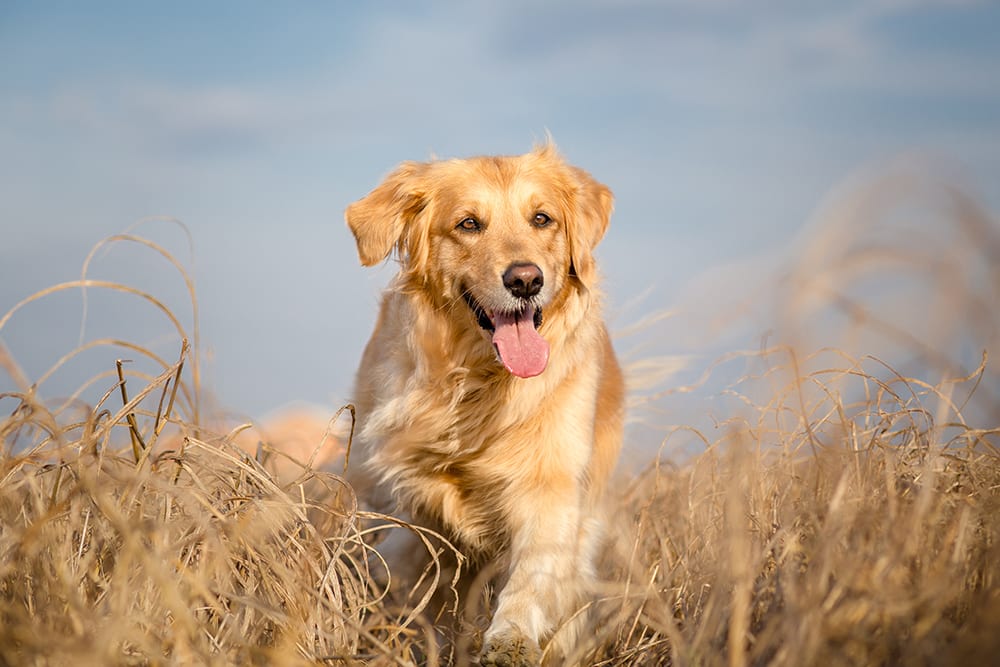Your Dog's Allergic Reaction
Allergic reactions happen when your pet's immune system overreacts to a certain substance (called an allergen). These substances are generally harmless to most pets, but some dogs have a hypersensitivity, leading to allergies and their associated symptoms.
The immune system usually works to fight off disease and infection but, in the case of allergies, it misidentifies the substance as dangerous and produces unpleasant familiar symptoms (itchy eyes, skin issues, sneezing etc) in an attempt to expel the 'dangerous' substance. Some common causes of allergies in dogs include:
- Fungus
- Grass
- Weeds
- Mold spores
- Pollen
- Saliva from flea bites
Seasonal Allergies In Dogs
Seasonal allergens are a common cause of allergic reactions in dogs, and although most allergies are incurable there are several methods of treatment and management to ensure your pet's wellbeing and quality of life. Any dog can have seasonal allergies, but there are particular breeds that seem to be more prone to having allergic reactions, including Setters, Pugs, Terriers, Bulldogs, and Retrievers.
Signs That Your Dog May Have Seasonal Allergies
A dog's allergic reaction can range in severity, but since even mild cases of seasonal allergies can cause major discomfort it's important to recognize potential signs. If your dog is suffering from seasonal allergies you will likely notice one or more of the following symptoms:
- Scratching or biting at skin because of irritation or itchiness
- Atopic dermatitis
- Skin infection or irritation
- Respiratory issues (e.g. coughing, wheezing, issues breathing)
- Shedding and hair loss
- Scooting (dragging butt across the ground) and/or licking rear
- Ear infections, waxy ears, reddened ears
- Shaking head– This is an especially common allergic reaction for dogs with floppy ears such as basset hounds.
These symptoms are going to make your dog feel very uncomfortable and may even be painful or dangerous, so contact your vet as soon as possible to have your pet's condition diagnosed and treatment can begin. .
How Vets Diagnose Seasonal Allergies in Dogs
Your dog's veterinarian will be able to diagnose seasonal allergies by discussing your pet's history with you, performing a physical examination, run a number of diagnostic tests. Your vet may also recommend a specialist veterinary dermatologist for skin testing, which is an accurate way to have seasonal allergies diagnosed.
What to Give a Dog For Allergies
Although there is no cure for allergies or one singular treatment to address seasonal allergies, there are options for the treatment and management in dogs:
- Change your daily walk time
- Alter your daily walk routine
- Remove excess allergens
- Clean your home
- Dog shampoo
- Topical solutions
If your dog has a particularly severe reaction, contact your vet at once!
Medications to Treat Seasonal Allergies in Dogs
Your vet or veterinary dermatologist might recommend an allergy serum, which is a series of allergen injections that slowly increase in dose over time. The needle you'll use is very small, but you can administer this medication at home with the guidance of a vet.
Oral prescription medications are another option, as are anti-itch medications and immune response modulating medications. These must be prescribed by your vet, so ensure you discuss side effects or potential complications with them first.
Therapeutic Diet For Dogs with Seasonal Allergies
Seasonal allergies in dogs can be treated using a vet-prescribed therapeutic diet, and certain therapeutic dog foods are specially formulated to help manage your dog's skin allergies. Your veterinary specialist will be able to help your pooch
Note: The advice provided in this post is intended for informational purposes and does not constitute medical advice regarding pets. For an accurate diagnosis of your pet's condition, please make an appointment with your vet.
Is your pup experiencing uncomfortable symptoms related to seasonal allergies? Contact our Huntersville vets today to book an appointment for your canine companion.
Looking for a vet in Huntersville and Mecklenburg County?
We're always accepting new patients, so contact our veterinary hospital today to book your pet's first appointment.
Related Articles View All
Puppy’s First Vet Visit: Checklist & What to Expect
Set your new puppy on the path to good health by getting the most out of each vet visit. Here is what you can expect from your puppy's first vet visit, along with a checklist of things to take and questions to ask your vet.
Kitten's First Vet Visit: What to Expect
So you have just brought home a little bundle of joy. Congratulations! But make sure you're scheduling your first veterinary appointment, as well as routine exams going forward. To help you prepare, our Huntersville vets discuss what to expect at your kitten's first appointment.
How often should I take my dog to the vet?
Regular veterinary care including checkups, parasite prevention, and vaccinations are the key to keeping your dog healthy throughout their lifetime. But, how often should you take your dog to the vet, and how can you save money? Read on to find out.
Bladder Stones in Dogs
Broken jaws are an alarmingly common, and painful, injury in our canine companions. In today's post, you will learn some of the causes of a broken jaw in dogs, how they can be repaired, and a few tips on caring for your dog as their jaw heals.

